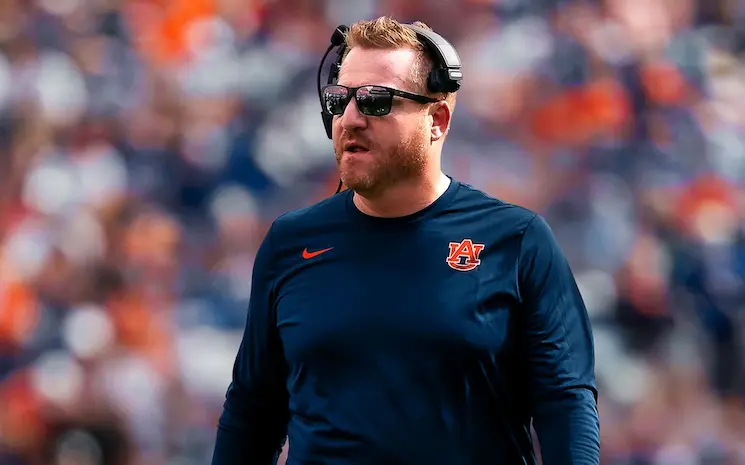
Griffin Merritt sat in the locker room with his Tennessee teammates in shock in late April. The Vols were 5-10 in SEC play and Merritt wasn’t having the season he envisioned when he transferred from Cincinnati last summer.
Something had “to change” and something did. Merritt found his rhythm and helped the Vols find theirs.
He is a major reason Tennessee is back in the College World Series for the second time in three seasons, accomplishing what he set out to do in Knoxville in the process.
Why Griffin Merritt Left His Hometown For The SEC
The Merritt family’s summer vacation to Siesta Key, Florida was stressful. Two months after Griffin’s senior season ended at Cincinnati he decided to enter the transfer portal.
Merritt planned on leaving college baseball behind to pursue a professional career after his senior season ended. He had discussions with MLB teams during the draft but “couldn’t come to terms with the teams” willing to take him.
The Cincinnati native didn’t have any interest in signing an undrafted free agent deal. Returning to his hometown school for a fifth season was the logical alternative, but there was nothing left for him to prove at Cincinnati.
Personally, Merritt was content, but he felt like he had to prove he could perform against top competition to scouts.
“If I’m not going to sign it can’t be just to do the same thing I was doing,” Merritt said of his thought process. “I needed to do what I did in a different conference, basically. Scouting wise, professionally, the SEC gets a lot of credit because scouts know that you’re competing at a professional level already in college.”
Merritt was looking for two specific things in a transfer destination: a place to prove he could produce at the highest level of college baseball and somewhere that could get to the College World Series. Cincinnati made a regional in Merritt’s freshman season but was a middling AAC team the following seasons.
“I want to go somewhere and win. I loved my time at Cincinnati and wouldn’t trade it for the world,” Merritt said. “But I wanted to win at the highest level.”
“My dream was to go to Omaha.”
Tennessee wasn’t looking for an outfielder in the transfer portal in July. They were bullish about incoming freshman outfielders Alex Stanwich, Reese Chapman and Dylan Dreiling and returned veterans Christian Scott, Kyle Booker and Hunter Ensley.
But Merritt was the type of veteran bat that you make room for. He would also balance out a left-handed heavy lineup.
“We’re looking and we needed another right-handed bat,” Tennessee associate head coach Josh Elander said. “When that one popped up and the ability to play the outfield and also maturity and he was player of the year which was a really good conference over there with Cincinnati. We just felt like it would be a good addition.”
Merritt returned to Cincinnati and began what he planned on being a hectic visit circuit. The outfielder’s plan was to visit Kentucky and Tennessee before making his way to Alabama, Arkansas, Texas and Oklahoma State.
He never made it south of Knoxville, committing to Tennessee during his visit.
“He’s a mature kid and he knew what he was looking for,” Elander said. “He wasn’t worried about stadium or cleats or gear. He said, ‘I want to be around people that can make me better and can win’ and fortunately for us it was a good match.”
A Forgettable Start To SEC Play
Merritt transferred to Tennessee in part because he wanted to prove he could hit at the same clip in the SEC as he did in the AAC. Things didn’t start well.
“People are questioning, texting all of us (coaches), can this guy play in the SEC?” Elander said. “Can he handle the velo and the breaking balls?”
Merritt started SEC play with a one-for-23 stretch at the plate which stretched through Tennessee’s first three SEC series.
“I think it was just baseball, man,” Merritt said, reflecting on the frustrating weeks.
And there were plenty of bad breaks and hard hit outs in the stretch— particularly in a three-game series against Texas A&M.
But Merritt also struggled adjusting to the SEC, particularly with fastballs up in the zone and the way pitchers mixed pitches.
“Versus (Texas) A&M, I remember one of their closers was throwing versus us and he (Merritt) was hitting balls in the dugout. I was worried he was going to kill one of us,” Elander joked. “He was so late and kind of (in) between.”
“A tougher transition,” Merritt said. “Not really matching up with my approach. I kind of had to settle into a different approach. … But overall I think it’s just made me a more complete and a better hitter. Learning how to adjust to different types of pitching.”
The numbers are the numbers and it was definitely “a rough couple of weeks” for Merritt. However, the college baseball veteran stayed the course, believing in his ability while knowing he would turn it around.
“I just kind of trusted the work I put in prior, trusted my routines, and understood that if you kind of just keep pounding that rock, even when it’s a little tough, you’ll get through it,” Merritt said.
Tennessee’s coaches felt the same way. The Cincinnati transfer was one of the Vols’ best hitters in the fall, batting over .300 against Tennessee’s elite pitching staff. Merritt began splitting starts in the outfield and at designated hitter but was still in the lineup at least once every weekend series.
“You can’t trick somebody into giving you a player of the year trophy,” Elander said. “I don’t care what conference you’re in. … You knew it was in there, it was just a matter of time.”
Merritt started seeing results in the Florida series, totaling four hits over the weekend including three in Tennessee’s series finale victory. However, it was two weeks later against Vanderbilt when Merritt completely changed his, and Tennessee’s, season.
The power hitter pinch hit for Christian Scott in the seventh inning, striking out and grounding out in his first two at-bats. Then Merritt revived the Vols’ season with a walk-off opposite field home run in the 12th inning.
It was a turning point for both Tennessee and Merritt. He played in every SEC game the remainder of the season, starting most of them. After starting one-for-23 (.043) in SEC play, Merritt went 22-for-59 (.373) at the plate with nine home runs, showing he more than belonged in the SEC.

A Goal Achieved
Merritt stood in the batter’s box at Pete Taylor Park after Zane Denton’s three-run homer gave Tennessee a 4-0 lead in game three of the Hattiesburg Super Regional. Merritt followed it up with a “horrible at-bat”, swinging over a pair of sliders before grounding out to third.
“I got thrown out by 10 steps at first and I remember clapping and looking at the crowd,” Merritt said. “Nobody cares (about the groundout). Nobody cares about who gets the big hit or who’s on base. You’re just doing everything you possibly can to get runs and that’s a pretty cool point to play at in the year.”
Merritt believes players should care about their productivity in baseball. Sure, it’s a team sport and “it’s all about the win” at the end of the day. But if you’re not contributing to the win you’re not doing your part.
That goes out the window in the postseason. Getting the win is the only thing that matters.
Merritt has made plenty of contributions for Tennessee this NCAA Tournament. He went six-of-13 (.462) earning All-Clemson Regional honors. Merritt was Tennessee’s most effective hitter in the Hattiesburg Super Regional going five-for-11 (.455) in three games.
The designated hitter enters Tennessee’s College World Series elimination game Monday afternoon hitting 12-for-28 (.428) in the NCAA Tournament, getting on base more than any other Vol. It’s a far cry from where Merritt was at the start of SEC play.
“It’s pretty special the way he’s turned it around because sometimes it goes the other way where guys kind of disappear,” Elander said. “I think that’s where the maturity and the character were the difference.”
Merritt came to Tennessee to make the College World Series. He was an integral part in making it happen. Merritt came to Tennessee to prove he could produce in the SEC like he did in the AAC. After hitting .315 with 19 home runs and 53 RBIs in his final season at Cincinnati, Merritt is hitting .314 with 18 home runs and 48 RBIs.
It’s been a successful year for Merritt, one he hopes to extend for a few days longer.
“The last couple weeks has been really cool and it’s been cool to see some of the younger guys start to understand that,” Merritt said. “That we’re at the point in the year where (you) throw everything out the door. We just need to produce runs and at the end of the day produce wins.”



